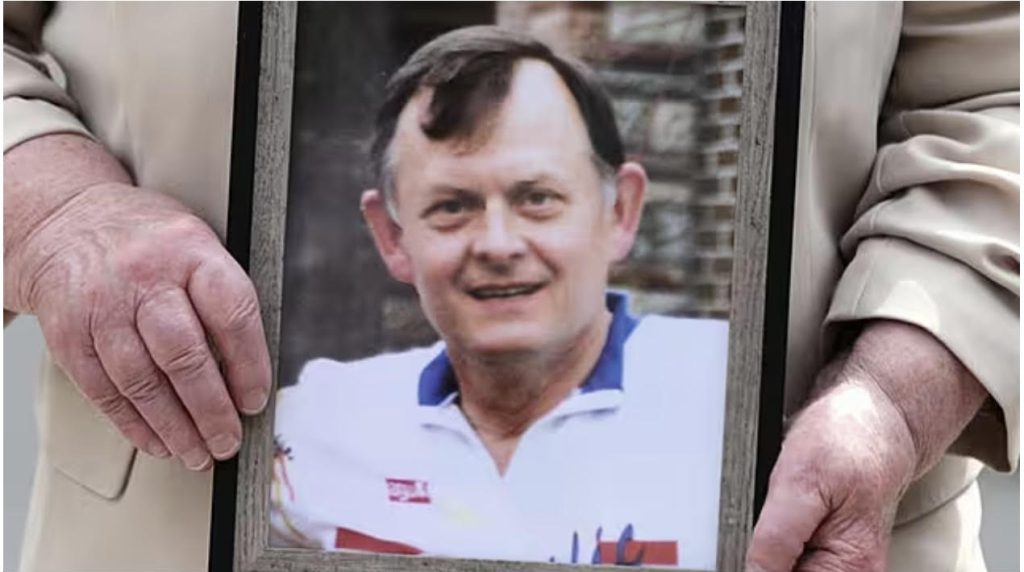This month is crunch time for the British government on one of the most prominent legal cases from the Northern Ireland conflict, with London now under severe pressure to set up an inquiry into the 1997 murder of Sean Brown, despite extensive evidence linking his killing to British state agents.
Sean Brown was abducted and killed by Loyalist paramilitaries less than a year before the Good Friday Agreement was announced. Brown was chairman of the GAA club Wolfe Tones Bellaghy in County Derry. Following a match at the grounds on 12 May, 1997, he was locking up the gates shortly after 11.30pm when he was attacked by a group of men and driven to Randalstown in County Antrim, where he was shot six times in the head. He was 61 years old.
After decades of campaigning, the Brown family finally managed to get the case before a coroner’s court last year.
But, exasperated at the lack of co-operation form the British side, Coroner Mr Justice Patrick Kinney took the unusual step of deciding the inquest could not continue because so much evidence was being withheld on the grounds of national security. Last March he ended the inquest and recommended that a full public inquiry instead be held into the case (where at least some of the material being withheld could be examined in closed proceedings).
The British government has fought this recommendation, and in December last year the High Court ruled that the current British Secretary of State Hilary Benn must indeed set up a public inquiry into the murder. The British government appealed against the ruling, and lost. Last week the Court of Appeal ruled that the Brown family has waited too long for the truth and that Benn must set up a public inquiry.
This is all very awkward for the British government, who clearly has secrets it want to continue to protect about the nature and extent of collusion with paramilitaries in this case and many others.
The Brown family says Benn was trying to push them into taking the case instead to the widely discredited Independent Commission for Reconciliation and Information Recovery (ICRIR), a body set up last year by the British government to deal with legacy cases. The ICRIR has little credibility with many of the bereaved families, and the Brown family is rightly insisting on a public inquiry.
The British government could take the case to the Supreme Court, but this would delay things further and only add to the levels of distrust between bereaved families and London. The court has given Benn four weeks in which to respond.
In September 2024, after many years of evasion and lies, the British government finally agreed to a public inquiry into the 1989 murder of Belfast human rights lawyer Pat Finucane. The organization I work for, Human Rights First, had been supporting the Finucane family for decades in their campaign for such an inquiry, which is expected to start later this year.
Sean Brown’s case is one of those featured in an extensive report last year on British sates impunity during the conflict. I was part of an international panel of experts convened by the Norwegian Centre for Human Rights which investigated killings and torture by British State forces, and British security force’s collusion with paramilitary groups during the Northern Ireland conflict. In 2024, after years of research, we published our report Bitter Legacy, concluding that the British government operated a “widespread, systematic, and systemic” practice of impunity protecting security forces from sanction during the conflict in Northern Ireland.
Pressure is steadily growing on the British government as more truths are likely to be revealed this year about the actions of British security forces during the conflict.
In two separate cases, former British soldiers whose anonymity is protected by the courts will stand trial for murders and attempted murders from the early 1970s.
Solider F will go on trial in September, charged with two murders and five attempted murders on Bloody Sunday, January 30, 1972, when 14 peaceful civil rights protestors were killed by British soldiers in Derry.
In another case, a different soldier – confusingly given the same cipher, so also known as Solider F – is charged with murdering a man in May 1972 in Belfast. He and three other former soldiers – Soldiers B, C and D – will also be prosecuted for the attempted murders of two other victims in a separate incident.
These are for the months ahead, but Secretary of State Benn has an immediate decision to make in the coming weeks: will he agree to establish the public inquiry the courts have ruled he should, or continue to fight the case in an attempt to keep Britain’s embarrassing secrets hidden?
Follow Brian on Twitter @dooley_dooley


Leave a Reply